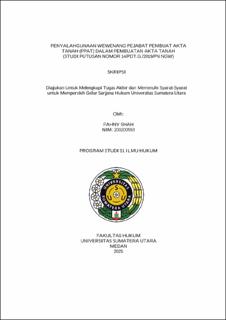Penyalahgunaan Wewenang Pejabat Pembuat Akta Tanah (PPAT) dalam Pembuatan Akta Tanah (Studi Putusan No. 14/Pdt.G./2019/PN Ngawi)
Abuse of Authority by the Land Deed Official (PPAT) in the Making of Land Deeds (Case Study of Decision No. 14/Pdt.G./2019/PN Ngawi)

Date
2025Author
Shah, Fahny
Advisor(s)
Sembiring, Idha Aprilyana
Tony
Metadata
Show full item recordAbstract
The issue of negligence committed by a Land Deed Official (PPAT) in carrying out their duties and authorities, whether done intentionally or through carelessness, may result in legal action or lawsuits against the PPAT. A PPAT’s misconduct or violation of authority and/or obligations can cause losses to the parties involved, making the PPAT legally accountable before the competent authorities. One example of such abuse of authority by a PPAT is reflected in the case registered under Decision Number 14/Pdt.G/2019/PN Ngw. Based on this context, this thesis is entitled: “Abuse of Authority by the Land Deed Official (PPAT) in the Execution of Land Deeds (Case Study of Decision Number 14/Pdt.G/2019/PN Ngw).” The research problem addressed in this thesis includes: (1) the forms of abuse of authority by a PPAT in the execution of land deeds, (2) the legal consequences of such abuse of authority, and (3) the legal liability of the PPAT involved in the abuse of authority as outlined in Decision Number 14/Pdt.G/2019/PN Ngw. This thesis applies a normative juridical research method, which focuses on legal norms and is conducted through literature study to obtain secondary data consisting of primary, secondary, and tertiary legal materials related to the issues under study. The nature of this research is descriptive. The findings of this legal research indicate that abuse of authority by a PPAT in the execution of land deeds may take various forms, including violations of the code of ethics, unfair competition, and practices that harm clients or other PPATs. The legal consequences for a PPAT proven to have abused their authority include administrative sanctions such as revocation of authority, and potentially criminal sanctions if the conduct violates applicable laws. The legal liability of the PPAT in Decision Number 14/Pdt.G/2019/PN Ngw demonstrates that a PPAT can be held civilly liable for damages resulting from negligence or abuse of authority that led to the issuance of a legally defective deed. In addition, the PPAT may also face administrative liability, including sanctions such as reprimands, warnings, or even revocation of their appointment as a PPAT.
Collections
- Undergraduate Theses [3142]
